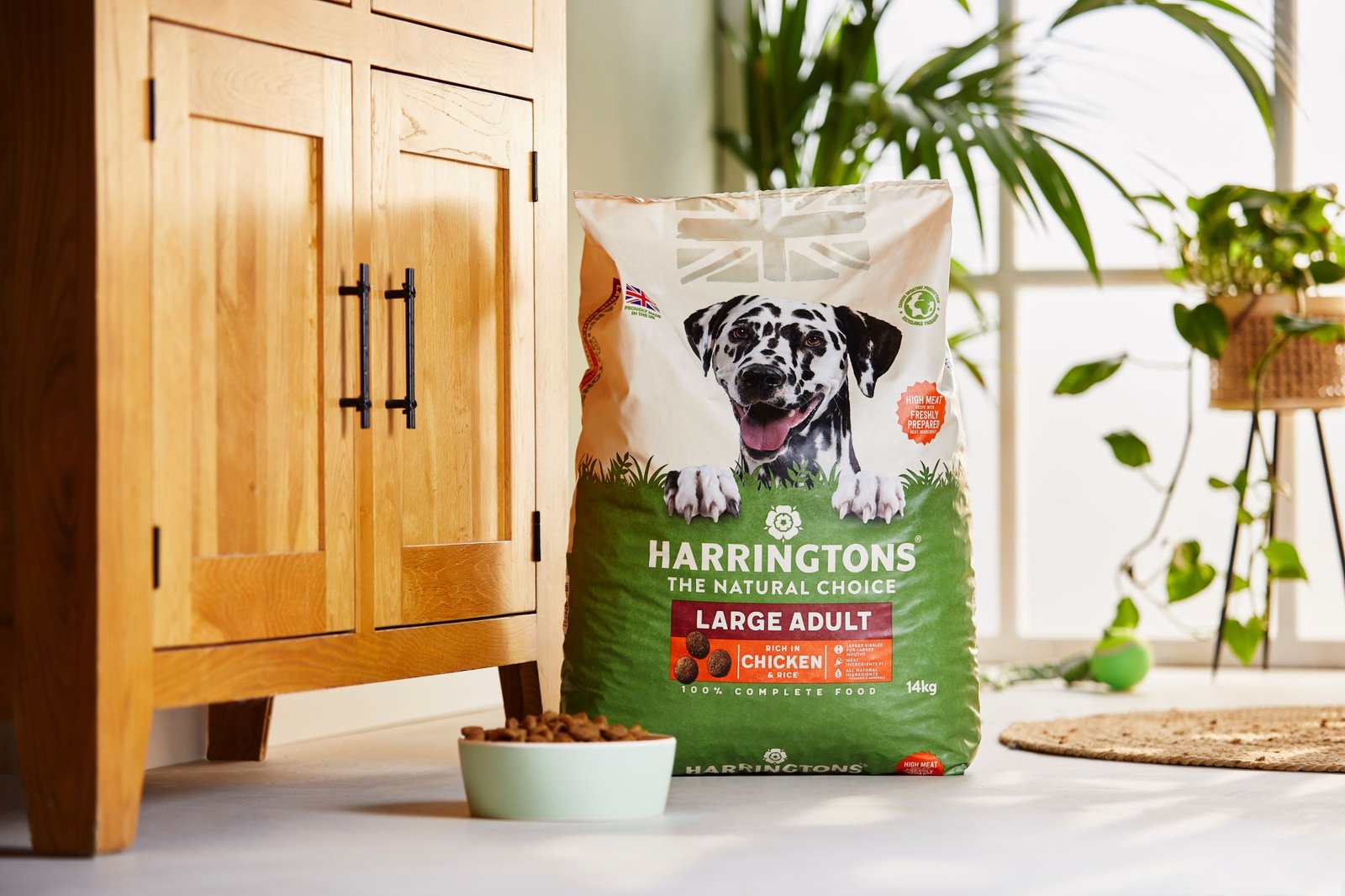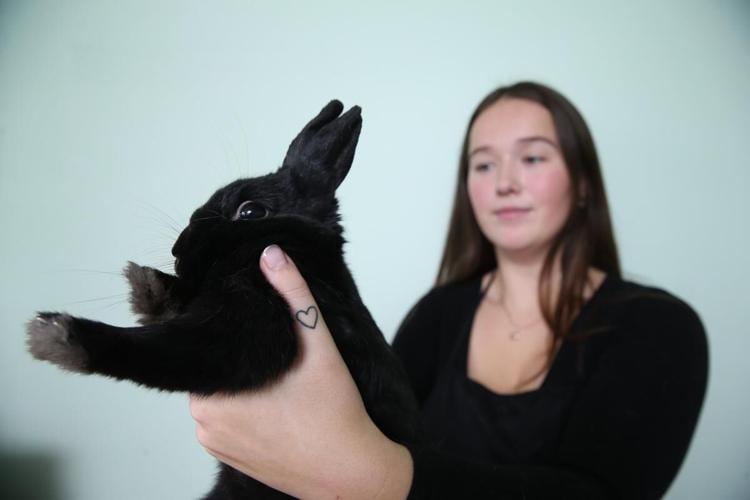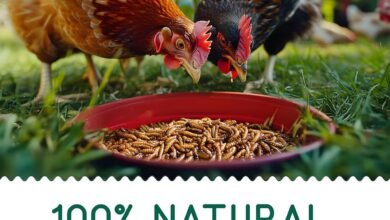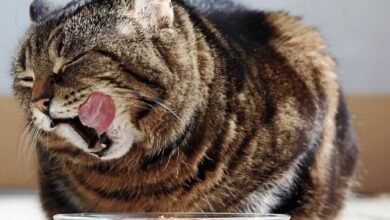
Rabbit food is a specially formulated diet for rabbits, providing essential nutrients for their health and well-being. In recent years, there has been a growing interest in rabbit nutrition to ensure they receive a balanced diet to support their growth and prevent health issues.
Rabbit food typically consists of a mix of hay, fresh vegetables, fruits, and specially made pellets that contain the necessary vitamins and minerals rabbits need. It’s important to choose high-quality rabbit food that meets their dietary requirements and avoid feeding them human food that may be harmful.
Providing a varied diet and ensuring they have access to fresh water is crucial for maintaining a healthy and happy rabbit.
Why Rabbit Food Is Essential For Your Fluffy Companion
Proper nutrition is crucial for the health and well-being of your fluffy companion. As a rabbit owner, you have a responsibility to provide your pet with a balanced diet that meets their nutritional needs. In this article, we will explore the importance of a balanced diet for rabbits and how you can ensure your furry friend gets the right rabbit food to thrive.
Importance Of A Balanced Diet For Rabbits
A balanced diet is essential for rabbits to maintain good health and prevent various health issues. Feeding your pet rabbit the proper rabbit food can help to:
- Promote proper growth and development
- Support a strong immune system
- Maintain healthy digestion
- Prevent obesity and related health problems
- Enhance dental health
Rabbits have unique dietary requirements. Their diet should consist of high-quality hay, fresh vegetables, and a small amount of pellets. These components provide the necessary fiber, vitamins, minerals, and protein that rabbits need to thrive.
Choosing The Right Rabbit Food
When selecting rabbit food, it’s important to consider the following factors:
- High fiber content: Rabbits require a high-fiber diet to ensure proper digestion and prevent gastrointestinal issues. Look for rabbit food with a high percentage of fiber to support their digestive health.
- Nutritional balance: Rabbit food should provide a balanced ratio of nutrients, including protein, vitamins, and minerals. This helps to meet the specific dietary needs of rabbits and support their overall well-being.
- Freshness and quality: Choose fresh and high-quality rabbit food to ensure your pet is getting the best nutrition. Check the expiration date and look for reputable brands that prioritize the health of rabbits.
- Feeding guidelines: Follow the recommended feeding guidelines provided by the rabbit food manufacturer. These guidelines consider the age, weight, and activity level of your rabbit, helping you to provide the appropriate portion size.
Remember, a healthy and happy rabbit starts with providing them with the right rabbit food. Consult with a veterinarian to get personalized recommendations for your fluffy companion’s diet and ensure they are receiving the best care possible.
Benefits Of Rabbit Food For Your Pet’s Health
Nutritional Requirements Of Rabbits
Rabbits have specific nutritional requirements that need to be met to ensure their overall health and well-being. Their diet should be high in fiber, low in fat, and rich in essential nutrients. A balanced diet is crucial for maintaining optimal health and preventing various diseases.
Essential Nutrients In Rabbit Food
Rabbit food is specifically formulated to provide all the essential nutrients that rabbits need. It typically contains a high level of fiber to support their digestive system and promote healthy digestion. Additionally, rabbit food is rich in vitamins, minerals, and protein, all of which are vital for the overall health of your furry friend.
Here are some key nutrients found in rabbit food:
- Fiber: Rabbits require a diet high in fiber to promote proper digestion and prevent gastrointestinal issues. It also aids in maintaining a healthy weight and preventing obesity.
- Vitamins: Rabbit food is fortified with essential vitamins like vitamin A, vitamin D, and vitamin E, which are crucial for maintaining healthy eyes, bones, and immune system.
- Minerals: Rabbit food contains minerals like calcium and phosphorus, which are important for maintaining strong bones and teeth. It also provides minerals like iron and zinc, which support various bodily functions.
- Protein: High-quality protein is necessary for your rabbit’s growth, muscle development, and overall well-being. Rabbit food usually contains plant-based protein sources such as hay, grass, and pellets.
How Rabbit Food Supports Proper Digestion
Rabbit food plays a crucial role in supporting proper digestion in rabbits. It contains a significant amount of dietary fiber, which is essential for maintaining a healthy gastrointestinal tract. Fiber helps prevent gastrointestinal stasis, a condition where the digestive system slows down or even stops, leading to various health issues.
The high fiber content in rabbit food also aids in preventing hairball formation and ensures the smooth movement of food through the digestive tract. It helps keep the digestive system active and prevents the accumulation of harmful bacteria.
Moreover, the presence of indigestible fiber promotes chewing and helps wear down the constantly growing teeth of rabbits. Proper chewing is crucial for maintaining dental health and preventing dental problems such as malocclusion.
Rabbit food’s carefully balanced ingredients, specifically designed for the digestive system of rabbits, protect their health and ensure optimal digestion.
Rabbit Food And Dental Health
Dental health is a vital aspect of a rabbit’s overall well-being. Rabbit food plays a significant role in maintaining their dental health. The abrasive nature of fibrous foods promotes natural wear of the teeth, preventing overgrowth that can lead to painful dental issues.
Additionally, rabbit food encourages chewing, which exercises the jaw muscles and stimulates saliva production. This helps to break down food particles and prevent the formation of plaque and tartar on the teeth.
By providing your pet rabbit with a balanced diet of rabbit food, you are actively ensuring their dental health, which is essential for them to lead a healthy and happy life.
In conclusion, rabbit food is specifically formulated to meet the nutritional requirements of rabbits, support proper digestion, and promote dental health. By incorporating rabbit food into your pet’s diet, you are taking important steps to ensure their overall well-being and longevity.
Choosing The Right Rabbit Food For Your Fluffy Companion
When it comes to ensuring the health and well-being of your beloved rabbit, their diet plays a crucial role. Providing your fluffy companion with the right rabbit food is essential to promote optimal health, energy, and longevity. However, with the wide array of options available on the market, it can be overwhelming to determine which rabbit food is best suited for your furry friend. This guide aims to simplify the process by exploring the different types of rabbit food available, factors to consider when making a selection, and tips for reading and interpreting ingredient labels.
Understanding The Different Types Of Rabbit Food Available
Before delving into the specifics of choosing the right rabbit food, it’s important to understand the different types that are available. The main options include:
- Pellets: These compact, uniformed pieces of food consist of a balanced blend of essential nutrients, such as fiber, protein, and vitamins. Pellets are a convenient option as they provide a consistent diet for your rabbit.
- Hay: Hay is a crucial component of a rabbit’s diet, providing essential fiber that supports healthy digestion. There are various types of hay available, including Timothy hay, orchard grass, and alfalfa hay, each with its own nutritional benefits.
- Fresh vegetables: Incorporating a variety of fresh vegetables into your rabbit’s diet is vital for providing additional nutrients, hydration, and enrichment. Leafy greens like romaine lettuce, kale, and spinach, as well as carrots and cucumbers, are popular choices.
Factors To Consider When Selecting Rabbit Food
When selecting the right rabbit food for your fluffy companion, there are several important factors to keep in mind:
- Age and life stage: The nutritional needs of rabbits can vary depending on their age and life stage. For instance, young rabbits may require food with higher protein content, while older rabbits may benefit from reduced calorie options.
- Health condition: If your rabbit has any specific health concerns or dietary restrictions, it’s important to choose a food that caters to those needs. Consult with your veterinarian for tailored recommendations.
- Ingredient quality: Opt for rabbit food that utilizes high-quality ingredients and avoids unnecessary fillers, additives, or preservatives. Look for natural, whole ingredients that will provide optimal nutrition for your rabbit.
- Palatability: Every rabbit has its own preferences when it comes to taste and texture. Experiment with different brands and flavors to find a food that your rabbit enjoys while also meeting its nutritional requirements.
- Budget: Consider your budget when selecting rabbit food. While it’s important to prioritize quality nutrition, there are options available at various price points, making it possible to find a suitable choice within your budget.
Reading And Interpreting Ingredient Labels
When evaluating rabbit food options, reading and interpreting ingredient labels can provide valuable insights into the nutritional profile of the food. Here are a few tips to consider:
- Look for a named animal protein source as one of the primary ingredients, such as Timothy hay or alfalfa hay.
- Avoid foods that contain excessive amounts of fillers, such as grains or sugars.
- Ensure the food contains a suitable fiber content, as rabbits require a diet high in fiber for proper digestion.
- Check for essential vitamins and minerals on the ingredient label to ensure your rabbit receives a well-rounded, balanced diet.
By understanding the types of rabbit food available, considering key factors, and knowing how to read ingredient labels effectively, you can confidently choose the right rabbit food that meets your fluffy companion’s nutritional needs. Remember, a well-balanced diet is the foundation of your rabbit’s health and happiness.
Feeding Your Rabbit A Balanced Diet With Rabbit Food
Ensuring your rabbit has a well-rounded and nutritious diet is essential for their overall health and well-being. One of the key components of a balanced rabbit diet is rabbit food. Rabbit food is specially formulated to meet the dietary needs of rabbits, providing them with essential vitamins, minerals, and fiber. In this article, we will explore the importance of feeding your rabbit a balanced diet with rabbit food, as well as provide some tips on recommended daily portions, mixing in fresh vegetables and hay, introducing new foods, and monitoring weight.
Recommended Daily Portions Of Rabbit Food
Feeding your rabbit the right amount of rabbit food is crucial for their health. The recommended daily portion of rabbit food depends on your rabbit’s age, size, and activity level. As a general guideline, adult rabbits should be fed approximately 1/4 to 1/2 cup of rabbit food per day. However, it’s important to note that overfeeding can lead to obesity and other health issues, so it’s always best to consult with your veterinarian to determine the ideal portion size for your specific rabbit.
Mixing Fresh Vegetables And Hay With Rabbit Food
Rabbit food alone is not enough to ensure a balanced diet for your rabbit. It should be supplemented with fresh vegetables and high-quality hay. Adding a variety of fresh vegetables to your rabbit’s diet provides them with additional nutrients and aids in digestive health. Some recommended vegetables include dark leafy greens, such as kale and romaine lettuce, as well as carrots and bell peppers. Additionally, offering your rabbit unlimited access to fresh hay is essential for their dental health and digestive system. Hay not only helps wear down their teeth, but it also provides the necessary fiber for healthy digestion.
Introducing New Foods To Your Rabbit’s Diet
When introducing new foods to your rabbit’s diet, it’s important to do so gradually. Rabbits have sensitive digestive systems, and sudden changes in their diet can cause digestive upset. Start by introducing small amounts of the new food and gradually increase it over time. Additionally, it’s important to observe how your rabbit reacts to the new food. If you notice any signs of digestive discomfort, such as loose stools or loss of appetite, it’s best to discontinue feeding that particular food and consult with your veterinarian.
Monitoring Weight And Adjusting Portion Sizes
Regularly monitoring your rabbit’s weight is crucial in ensuring they maintain a healthy weight. Obesity is a common issue among pet rabbits and can lead to a host of health problems. To prevent obesity, it’s important to adjust portion sizes as needed. If your rabbit is gaining weight, you may need to reduce the amount of rabbit food they are receiving. Conversely, if your rabbit is losing weight or appears underweight, you may need to increase their portion sizes. It’s always best to consult with your veterinarian to determine the appropriate portion sizes for your rabbit’s specific needs.
Common Mistakes To Avoid When Feeding Your Rabbit Rabbit Food
When it comes to feeding your rabbit rabbit food, it’s essential to be mindful of the common mistakes that many rabbit owners unknowingly make. By avoiding these mistakes, you can ensure that your furry friend stays healthy and happy. In this blog post, we will discuss the three most common mistakes to avoid when feeding your rabbit rabbit food.
Overfeeding Or Underfeeding Your Rabbit
One of the most common mistakes rabbit owners make is overfeeding or underfeeding their rabbits. Rabbits have specific dietary requirements, and it is crucial to provide them with the right amount of food. Overfeeding your rabbit can lead to obesity, which can have serious health consequences. On the other hand, underfeeding your rabbit can result in malnutrition and weight loss.
To ensure that you are feeding your rabbit the appropriate amount of rabbit food, it is recommended to consult your veterinarian. They can provide guidance on the correct portion sizes based on your rabbit’s age, weight, and activity level. It’s important to remember that every rabbit is unique, and their diet should be tailored accordingly.
Giving Your Rabbit Unsafe Or Inappropriate Foods
Another mistake to avoid is giving your rabbit unsafe or inappropriate foods. While rabbits are herbivores, not all fruits and vegetables are safe for them to consume. Some fruits and vegetables can be toxic to rabbits and can cause digestive issues or other health problems.
It’s crucial to be aware of which foods are safe for rabbits and which should be avoided. Safe options include leafy greens like romaine lettuce, cilantro, and parsley. However, foods such as chocolate, onions, or tomatoes should never be given to rabbits. If you are unsure whether a specific food is safe for your rabbit, it’s best to consult your veterinarian or do thorough research beforehand.
Not Providing Enough Water Alongside Rabbit Food
Water plays a vital role in a rabbit’s diet, and not providing enough water alongside rabbit food is a common mistake that rabbit owners make. Rabbits need access to fresh, clean water at all times. Water helps with digestion, prevents dehydration, and aids in maintaining healthy organ function.
Ensure that your rabbit always has access to a water bottle or a water bowl filled with clean, freshwater. Check the water supply regularly to make sure it is not empty or contaminated. Providing enough water alongside rabbit food will help to promote proper hydration and overall well-being for your furry companion.
By avoiding these common mistakes when feeding your rabbit rabbit food, you can ensure that your furry friend receives a balanced and nutritious diet. Remember to consult your veterinarian for personalized advice and always prioritize your rabbit’s health and well-being.

Credit: www.thestar.com
Faqs About Rabbit Food For Your Fluffy Companion
Welcome to our FAQ section about rabbit food for your fluffy companion. Feeding your rabbit a balanced diet is essential for its health and well-being. In this post, we will address commonly asked questions about rabbit food to help you make informed decisions for your furry friend. From whether fruits can be included in their diet, to how often you should feed them, and even if making homemade rabbit food is a good idea – we’ve got you covered. Let’s dive right in!
Can Rabbits Eat Fruits Alongside Rabbit Food?
While rabbits primarily thrive on a diet of hay, fresh vegetables, and specially formulated rabbit food, some fruits can also be given to them as occasional treats. These sweet delights are a great source of vitamins and fiber. However, it’s important to remember that fruits are high in sugar, so they should be fed sparingly.
Rabbits can enjoy treats like apples, bananas, berries, and melons in small portions. When introducing fruits to your rabbit’s diet, make sure to wash them thoroughly, remove any seeds or pits, and cut them into bite-sized pieces. Always monitor how your rabbit reacts to the new addition, and if any digestive issues arise, consult a veterinarian.
How Often Should I Feed My Rabbit Rabbit Food?
A rabbit’s diet consists of a mix of fresh hay, vegetables, and rabbit food pellets. When it comes to rabbit food pellets, it is generally recommended to provide about 1/4 cup to 1/2 cup of pellets per day, depending on your rabbit’s size and age. However, it’s important to note that hay should be the main component of their diet, accounting for about 80% of their daily food intake.
To ensure a well-balanced diet, divide your rabbit’s daily food portion into two meals – one in the morning and one in the evening. This will not only help regulate their digestive system but also prevent overeating. Remember, each rabbit is unique, so monitor their weight and adjust the amount of rabbit food accordingly.
Can I Make Homemade Rabbit Food For My Pet?
While there are commercially available rabbit food pellets that provide a balanced diet for your fluffy companion, some pet owners prefer making their own homemade rabbit food. Creating homemade rabbit food allows you to have better control over the ingredients and ensure the freshness of the food.
If you are considering making homemade rabbit food, it’s important to consult a rabbit-savvy veterinarian or a rabbit nutritionist who can guide you through the process. They can help you determine the right combination of hay, vegetables, and other ingredients to meet your rabbit’s nutritional needs.
Remember, it’s essential to maintain the proper balance of fiber, protein, and other nutrients in your rabbit’s diet. Caution should be exercised to avoid overfeeding your rabbit or providing excessive amounts of certain ingredients that may be harmful to their health.
Frequently Asked Questions Of Rabbit Food
What Should I Feed My Rabbit?
Rabbits should primarily be fed with hay, fresh vegetables, and a limited amount of pellets. Hay provides the necessary fiber in their diet, while fresh veggies offer additional nutrients. Pellets should only be a small portion of their daily intake to prevent overfeeding.
How Much Hay Should I Feed My Rabbit?
A rabbit should have access to unlimited hay at all times. They require a constant flow of fiber for their digestive health. Make sure to provide fresh and good-quality hay such as Timothy or Orchard grass to keep their teeth and digestion in check.
Can Rabbits Eat Fruits And Vegetables?
Yes, rabbits can eat a variety of fruits and vegetables. However, it’s essential to introduce them slowly to prevent digestive issues. Stick to rabbit-safe options such as leafy greens, carrots, apples, and strawberries. Avoid giving them anything toxic or high in sugar.
How Often Should I Feed My Rabbit Pellets?
Rabbits only need a small portion of pellets daily. Adult rabbits should be given about 1/4 to 1/2 cup per day, while younger rabbits require more. Monitor their weight and adjust the amount accordingly. Remember, the majority of their diet should consist of hay and fresh greens.
Conclusion
To wrap up, incorporating rabbit food into your pet’s diet is essential for their overall health and well-being. By providing a variety of fresh vegetables, hay, and pellets, you can ensure they receive the necessary nutrients they need. Remember to introduce new foods gradually and monitor their digestive system.
Your furry companion will be grateful for the extra care you put into their diet, leading to a vibrant and happy life together.



